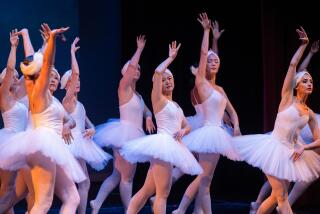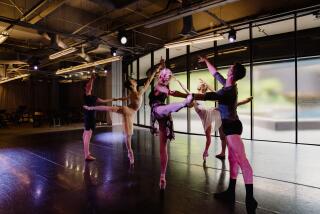Akram Khan and his dance company take the ‘Vertical Road’
For the record, Akram Khan has not spent the last couple of months obsessing over the possible reasons for why NBC edited out his eight-minute dance about mortality in its coverage of the Olympic Games opening ceremony, using the time for Ryan Seacrest to interview an athlete instead. Granted, the television network never sent Khan a personal note of apology or explanation but “I’m a big fan of swimming, so maybe I took it better than I might have because it was Michael Phelps,” he says jokingly.
Turning serious, he suggests “My guess on why they did that was that my work was too artistic, too fragile and they wanted the biggest possible audience. And my piece was about the fact that one day, we will all die, that death is the only certain thing.”
Before the Summer Olympics, Khan had already achieved a reputation as one of the U.K.’s most celebrated choreographers. Born 38 years ago in London to Bangladeshi parents, he founded his own company in 2000 and immediately received critical acclaim for thematically sophisticated works that uniquely merged contemporary dance with the Indian classical dance form Kathak, which he first studied at the age of 7.
A few years later, he embarked on a series of high-profile collaborations that included duets with Flemish Moroccan choreographer Sidi Larbi Cherkaoui, French ballerina Sylvie Guillem and actress Juliette Binoche. Most recently, the choreographer and dancer has focused on creating ensemble works for his own company and returning to solo performance, such as his 2011 “Desh,” where he delves into his immigrant heritage.
Despite what some saw as a snub by NBC, Khan’s fame has surged globally after millions of Olympics viewers outside the U.S. watched him and 50 other dancers perform his choreography to Emeli Sandé’s song “Abide With Me.”
“He’s like the Madonna of the dance world now,” says Sade Alleyne, a dancer in Khan’s company, which maintains a jam-packed international touring schedule. “Architects, bus drivers … all these people who aren’t dancers now know who he is.”
Southern California audiences will have the opportunity to see one of Khan’s most ambitious works when his eponymous company performs the 2010 “Vertical Road” at Royce Hall on Friday and Saturday and at the Irvine Barclay Theatre on Oct. 10. The 70-minute work features seven dancers from different countries and movement backgrounds, music by Khan’s longtime collaborator Nitin Sawhney and an array of kinetic imagery inspired by the choreographer’s yearlong investigation into the concept of spirituality.
FALL ARTS PREVIEW: Critic’s Picks
The dance’s title, in fact, stems from “a common denominator” that Khan observed in his exploration of both Eastern and Western expressions of spirituality that included Sufi mysticism, Rumi’s poetry and the paintings of William Blake, which all “speak of this in-between space between earth and sky, this vertical axis,” he says.
Khan traces the genesis of “Vertical Road” to a life-altering experience in 2009 after a performance with Binoche at the Sydney Opera House. He had hailed a taxi outside the theater, only to watch it get swiftly commandeered by a couple who complimented his performance before stealing his cab. Angered by the couple’s rudeness, Khan proceeded to hail a second taxi. When he got into the car, he inexplicably decided to call his father “and we don’t have a phone relationship,” he recalls.
Khan spoke to his father in Bengali and when he got off the phone, the taxi driver started asking him personal questions. Khan became increasingly paranoid until the driver revealed that he knew Kahn’s father from childhood and had been searching for him for 35 years.
“I couldn’t find any logic to this story; it was too big of a coincidence. The only way I could explain it was through a spiritual connection, something I couldn’t see or make sense of,” he says. “So I decided to take this risk, to attempt to say something about life and death and what happens after death.”
Khan’s efforts toward this end seem to have confounded a number of critics who simultaneously praise the dance’s beauty and intricacy while noting it can also be ponderous and overly opaque. But the choreographer says his work is not about entertaining the audience at every second. “I despise that word, ‘entertainment.’ To be honest, I’ve grown tediously bored with the Lady Gagas of the world and how they’re regarded as the gods,” he says. “‘Vertical Road’ is not something you’d be entertained by but it asks questions that will provoke you.”
“For Akram, it’s not so much about how to make a successful show that entertains everyone, it’s about how he can advance the practice of dance and this journey that he excavates with his dancers,” says Kristy Edmunds, the artistic director of Center for the Art of Performance at UCLA, which is presenting his company at Royce Hall.
Over the years, Khan has developed a highly rigorous choreographic process in which he gives his dancers tasks to generate movement. He learns his dancers’ movements, transforms them in his own body and teaches the results back to the dancers. “So even though my body isn’t onstage with them, it’s been represented in the process,” he says.
“Working with Akram is like experiencing a car crash in your own body, where you’re working your way through loads and loads of information,” says Alleyne. “But he does everything with you so it doesn’t cross your mind that anything is impossible. Being in the studio with him is a real collaboration.”
Currently, Khan seems newly energized by his artistic practice, having recovered from snapping his Achilles tendon in January and which forced him to “create dance in my mind. But my biggest creation will premiere in March,” he says of expecting his first child. “Trying to find names for the baby, that’s what’s driving me now, that and knowing my kids will definitely be onstage one day. I’ll force them just like my mom did with me.”
----------------------------------
Akram Khan Company
Where: Royce Hall, UCLA Campus
When: 8 p.m. Friday and Saturday
Price: $20 to $55
Contact: (310) 825-2101 or https://www.cap.ucla.edu
Where: Irvine Barclay Theatre, 4242 Campus Drive, Irvine
When: 8 p.m. Oct. 10
Price: $16 to $43
Contact: (949) 854-4646 or thebarclay.org
MORE:
CRITIC’S PICKS: Fall Arts Preview
TIMELINE: John Cage’s Los Angeles
More to Read
The biggest entertainment stories
Get our big stories about Hollywood, film, television, music, arts, culture and more right in your inbox as soon as they publish.
You may occasionally receive promotional content from the Los Angeles Times.










